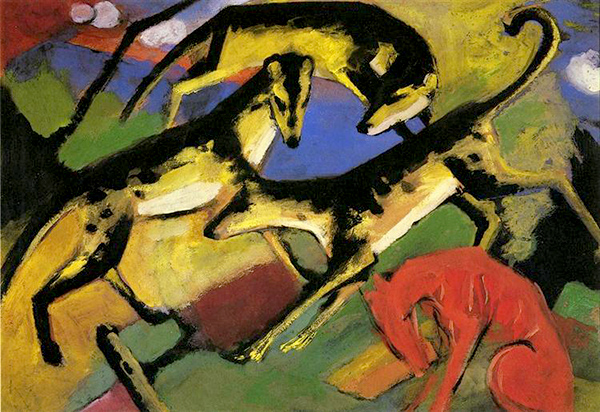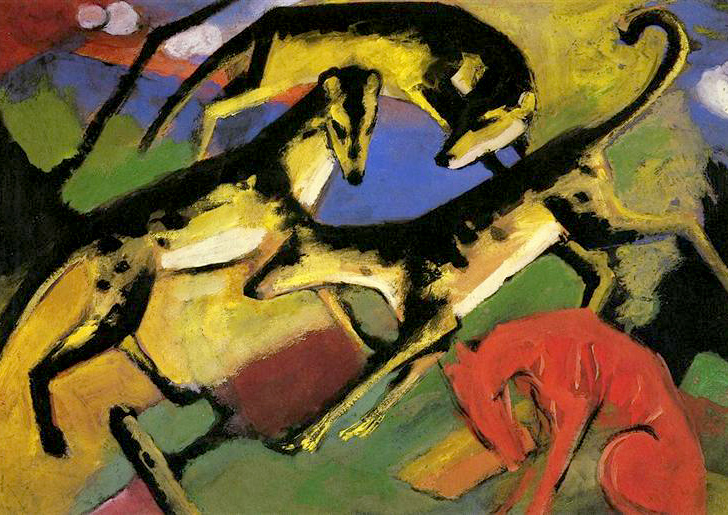
Zareto and I, we are squatting by the dumpsters behind the building. We are mesmerized by the six newborn kittens. “Sofi, Sofi, look how sweet!” I am looking. I am her aunt from America, but don’t want to be called Aunt, so she calls me by name. Kids in Bulgaria call every old-ish woman “aunt.” Aunts are the cafeteria ladies, the cleaning ladies, the neighbors sitting on benches in front of buildings. Aunt is an older, fatter version of your mother. I am no aunt to anybody. I am Sofia, a nice international name, which should be used more often. I am named after the city I left. If we want to be precise, I should be called New York now. My teenage daughter also wants to call me by my first name, this I don’t allow. I am “mom” to her and only to her and that’s that.
They first came when communism fell. Maybe their arrival foretold the fall, but the crows are still flying and signifying something.
Hundreds of fleas jump around on the kittens. One moment it looks like one kitten has a black spot on its forehead and then the spot jumps and moves to its chin. Blue flies land on their faces, buzzing louder than the meows. Confused, the kittens lick their muzzles with tiny pink tongues. I’ve been told their tongues feel like Velcro—I’m pretty sure I’m never gonna know.
Every evening around seven we watch the thick, long, black line of crows fly from the left to the right side of the sky. We used to think it was an omen, but they’ve been passing by at seven for years. They first came when communism fell. Maybe their arrival foretold the fall, but the crows are still flying and signifying something. Crows are smart, and we suspect they are headed toward the big city dumpster in the Ilienzy neighborhood, which is refreshed with the city’s garbage every evening. If that’s not it then they’re just exercising.
After hours of kitten-watching, we go and squat in the playground with the overheated metal slides and the broken swings. There is a fruit and vegetable store there, which also sells beer. Mothers sit on the white plastic chairs around the plastic tables, sipping from dark brown bottles, taking sexy drags from their cigarettes, while squinting dramatically to avoid smoke in the eyes, and socialize. Their kids try hard to have fun hanging upside down on the rusty metal globe. The elderly “aunts” on the bench in front the building don’t approve of the mothers’ beer-drinking and cigarette-smoking and sometimes you can hear the word bitch casually dropped. A lot of the moms are single or divorced. Like in the rest of nature, fathers are hard to keep.
Under the mulberry tree, there is a cardboard box that someone left for the stray bitch so that she could have a home for her three puppies. They were born a few days ago, same as the kittens, on The Big Mother of God holiday. The whole building finds this to be a sign of something good to come. Our neighbors stop by and leave bones for the dog, then they go around the dumpster and leave milk in small plates and jar lids around the other mother, like votive candles.
She is tucked into an old woolen solder’s blanket, made to look like a nest. People are compassionate in Hope #6, our neighborhood. They leave decent clothes and shoes on one side of the dumpster, so poorer people can take them. They also hang stale moldy bread in see-through plastic bags on the handles of the dumpster, so the villagers across the river may feed them to the chickens and the pigs. It is also a sin to throw away bread and you should cross yourself first.
The bitch, and I really don’t like calling her that, has probably slept with the entire pack of stray dogs in “the bush.”
The bitch, and I really don’t like calling her that, has probably slept with the entire pack of stray dogs in “the bush.” My sister named the bush “the bush” after she came back from Zimbabwe. There, bush can refer to a large empty area covered with grass, weeds, and thorns. This is exactly what we have here. Before we used to call it “The Empty,” but bush was better because it was an English word so somehow it brought up the value of this particular real estate. The government was going to continue building the tall apartment buildings there, but then communism fell. Several packs of stray dogs share the space now. People go through the bush as a short cut to catch the bus, but not at night, unless very drunk, because the dogs get angry and attack.
We named our bitch Jenny, just so she can have a name and also because we are not sure if we are related. Our Irish setter Max ran away once and after we called out his name for three days, we found him in the bush, laying next to the bitch and not reacting to his name. His eyes had the absent-minded expression of a teenage junkie. We practically dragged him home and spent a fortune ridding him of thorns, fleas, ticks, and lice. The three puppies are all brown like Max, but that doesn’t mean anything. A lot of the stray dogs are brown, too. And so is the bitch. We called her Jenny just so we can call her something other than bitch, because it isn’t a good name in Bulgarian either.
The stray dogs had apartments during communism, but when it fell, their owners didn’t have money to feed them so they let them go. This is how we first found Maxy. We cleaned him up and kept him. He immediately led us to his former owner’s apartment building. She was a sour-faced woman with bleach-blond hair and a faded robe. The first time she saw him she feigned surprise and took him back. We found him in the bush a week later, a dirty sorry affair. We paid the vet to clean him up again. Maxy took us back to the owner and we asked her what was the matter. She cried and said she was sorry but she couldn’t afford a dog anymore. Max understood and never went back; he became part of our family.
Before we would say, “Where are the squirrels, Maxy? Look, look, where are the squirrels?” and he would go crazy, he’d bring his leash and start barking at the door, until we got out and into the park to chase the squirrels. His mission in life was to keep the park clean of squirrels and birds. Irish setters are hunters and if they can’t do that they get depressed, like people. Now we say, “Where is Jenny, let’s go see Jenny!” And he would pick up his leash and bark and we’d go out to the park, and never to the bush, because cleaning him is really expensive, plus it feels like a taking your son to a whorehouse type of thing.
And even if we go, what are we supposed to do, stay in the middle of the bush and yell “Jeeenyyy?” She doesn’t even know that that’s her name. And also there may be at least five other Jennies, since the Bulgarian people really likes to call their dogs English names and Jenny is a top choice.
It all sounds cruel towards Max but it’s actually humane if you think about it. We know we shouldn’t bring up Jenny, but we enjoy our superiority and the fact that he doesn’t know how to speak yet. It feels like he knows very well but stubbornly keeps it a secret. We are provoking him, so he can snap out of it one day and say “Cut it out, bitches! That’s no way to treat a friend!” Then we’d of course go and find Jenny. But he hasn’t said anything yet, so we are status quo. He is the smartest thing we know, but only in the matters of Jenny is he stupid. As a result he doesn’t know he may be a father.
So we are squatting with Zareto and we are watching the three puppies but we aren’t touching them. Our arms are crossed tightly over our chests behind our knees. We are fighting with an enormous urge to pet and hug. We look like two knots.
I’ve discovered that in a knot position you relax very well. I learned this in Chinatown, that’s how some people wait for the bus, or for something better to come along, just squatting on the street.
I will hold up a strawberry and she’d extend her hand and pretend to take it on the other side and eat it.
I also fight with the desire to hug and kiss Zareto when we Skype. It is strange how physical our long-distance tenderness is. Our hands move up in an empty hug position. We pet the screen, which we know is silly. We also pretend to give each other things; I will hold up a strawberry and she’ll extend her hand and pretend to take it on the other side and eat it.
Bulgarians are physical people. I discovered that when I left and came to New York. We touch each other when we talk, we ruffle our friend’s hair or hold their face in our hands to get their full attention. We hug and kiss when we meet and when we part, and while together we often walk arm-in-arm. I feel a physical pull like a magnet. Something like the material in the beak of a bird showing her where south is in the spring. The same material in my beak is dragging me back to Hope #6 so I can hug and kiss all these people but especially Zareto, since she is still a small thing, and my daughter isn’t. Zareto sits next to you and leans on you the way a kitten would. I kiss her head about thirty to thirty-five times a day.
I sometimes pretend that I’m not looking for a moment and Zareto quickly stretches out her index finger and pets the fur of the closest puppy. I let her for a few minutes then I turn and look at her with this “you-know-they-have-diseases” look. She answers, “I know,” and just extends her finger out to me expectantly and I pour some water on it, from our plastic Gornobanska mineral water bottle, refilled with tap. Then we get up, hold hands, and go about our business of looking for other small and cute things not to pet.
